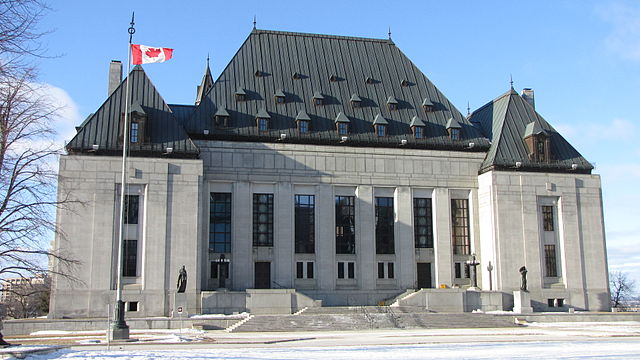In Canada’s Quebec Province, there has been an on-going debate over the teaching of a government mandated Ethics and Religious Culture Program (Programme Éthique et culture religieuse.) The ERC school curriculum was created and implemented in 2008 by former premier Jean Charest. Since that point it has caused multiple controversies and court cases which have now taken the debate to the steps of Canada’s highest court.

Canadian Supreme Court (Photo Credit: D. Gordon E. Robertson, cc lic. Wikimedia)
According to this mandate all Quebec schools, private and public, must teach a prescribed Ethics and Religious Culture curriculum or an equivalent. The province’s website explains:
For the purposes of this program, instruction in ethics is aimed at developing an understanding of ethical questions that allows students to make judicious choices based on knowledge of the values and references present in society. The objective is not to propose or impose moral rules, nor to study philosophical doctrines and systems in an exhaustive manner.
Instruction in religious culture, for its part, is aimed at fostering an understanding of several religious traditions whose influence has been felt and is still felt in our society today. In this regard, emphasis will be placed on Québecs religious heritage. The historical and cultural importance of Catholicism and Protestantism will be given particular prominence. The goal is neither to accompany students in a spiritual quest, nor to present the history of doctrines and religions, nor to promote some new common religious doctrine aimed at replacing specific beliefs.
To summarize, the program’s goal is twofold: to expose children to aspects of Quebec’s own culture and to engage in a type of diversity training. Religions included are Christianity (Catholicism and Protestantism), Judaism, Native spirituality, Islam, Buddhism, Hinduism, and “other religions.” The aim is not at all spiritual instruction. Author Brendan Myers, a Druidic Humanist and Philosophy professor explains:
Quebec was, up until around 50 years ago, a Catholic theocracy in all but name. Several Christian institutions, most prominently the Catholic Church, were the main taxpayer-funded service providers in education, health care, low-income housing and the like … The Quiet Revolution changed that and now most Quebecers want a vigorously humanist state. [The] “Ethics and Religious Culture” course is in some ways a continuation of Quiet Revolution values. Its purpose is to expose students to a lot of different ethical world views from a lot of different religions, and thus continue to move the culture further away from the Catholic lock-step of life before the Quiet Revolution.
In other words, the ERC is aimed at building a better secular state by educating its youth on the religious diversity found within its borders.

Brendan Myers
This government educational requirement is applicable even to the province’s private institutions. As Myers explains, Quebec regulates private schools with a “light tough.” For example, it might offer partial tuition subsides for “students attending schools meeting certain regulatory criteria.” However the ERC mandate has been handled differently. Myers says, “A private school which doesn’t offer this course won’t get its tuition subsidies for its students and might have its charter revoked.”
Since implementation in 2008 the program has come under considerable fire from both secular and religious communities. Should the government be allowed to force private religious schools to teach ethics that are contrary to their own belief structure? Should parents have the right to exempt their children from the program if its teachings are contrary to family belief? Should the teaching of religion and ethics instruction be allowed in secular schools at all?
The most recent battle began when a Montreal-based Catholic high school, Loyola, challenged the mandate by asking the government for an exemption. The school does not want to include what it considers to be a “neutral” teaching of Christianity. In its place the school would teach the ERC material but from “its own Jesuit style” that would be “respectful to [its] Catholic faith and morals.”
In 2008 the Quebec government refused the school’s request for exemption which sent the case to court. In 2010 a provincial Judge upheld the request saying, “The province’s order places Loyola in an untenable position: either it teaches the ERC program required by the Minister and thus violates its religious precepts, or it teaches the ERC course with its own program and thus violates the Act.”
In 2012 the province won an appeal which eventually led to the current Supreme Court case: Loyola High School, et al. v. Attorney General of Quebec. According to reports, the debate is now centered on a new issue – one that is particular to the reading of Quebec law. In its Charter of Human Rights and Freedoms religious rights are granted to “every person” and to “human beings.” The Charter never refers to institutions. Are the same religious freedoms, protections and rights granted to organizations such as Loyola?
![[Photo Credit: Flickr's Liz cc-lic Wikimedia]](https://wildhunt.org/wp-content/uploads/2014/04/Elementary_classroom_in_Alaska1-500x375.jpg)
[Photo Credit: Flickr’s Liz cc-lic Wikimedia]
Freedom for collective religious activity is important to Sikhs in Canada as it is impossible to be a Sikh by oneself but only as a part of a larger community of believers. A broad interpretation of freedom of religion is critical for the protection of minority religious groups which are more vulnerable to government interference in their internal functioning.
Other groups acting as interveners at the March 24 Supreme Court hearing were The Canadian Civil Liberties Association (CCLA), Seventh-day Adventist Church in Canada, Home School Legal Defence Association of Canada and a variety of Christian-based organizations. The CCLA wrote:
This appeal is of particular importance to the CCLA as it could determine and clarify – for the first time – whether and when a body corporate can invoke freedom of religion against the State. This is an increasingly pressing issue at the national and international levels
Should the school, as a “corporate body,” be granted the same religious freedom as an individual? Should it realize that freedom by way of exemption from teaching a mandated ethics curriculum that is in direct conflict with its own belief structure but aimed at the betterment of society? Can the celebration of religious pluralism within a multicultural environment overstep its bounds? These are the issues now facing the Canadian Supreme Court. The debate will continue as the province and country now await on the Court’s ruling.
(Webcast of hearing available. French only)
The Wild Hunt is not responsible for links to external content.
To join a conversation on this post:
Visit our The Wild Hunt subreddit! Point your favorite browser to https://www.reddit.com/r/The_Wild_Hunt_News/, then click “JOIN”. Make sure to click the bell, too, to be notified of new articles posted to our subreddit.

Mandatory religious training – and this is what it is – is not a “celebration of religious pluralism”. It is just a softer form of theocracy.
Actually, it appears to be the opposite. The Culture program is a secular and pluralistic approach to religion. The Canadian Catholics are resisting because they are trying to hold on to their religious dominance.
I think what sounds good on the surface maybe isn’t so good if you dig a little deeper. I can see where something like this could become a tool to batter away at whatever church, school, etc. the current governing body didn’t like. I realize the dominance of the Catholic Church is something that may need to go away but I’m not sure this is the best way to do it. This sounds like a really slippery slope that could backfire big time.
The Catholics certainly have their own agenda, and it is true they are currently the ones pressing a grievance. That said, no one benefits from a program which proposes to create and celebrate pluralism through mandatory conformity.
If a government truly values pluralism, the best thing it can do is to get the hell out of the way. Create a safe space through anti-discrimination laws and stay out of the business of trying to “help” people form their own consciences.
However noble the motivation may be, government helping people form their spirituality is much like a driver “helping” a bicyclist up a hill by nudging them along with their SUV. I come at this from a Yank perspective grounded in our First Amendment, but I think the underlying principle applies to any democracy and even more universally to human rights law.
From my own perspective, the RCC and its affiliated schools have every right to indoctrinate within their own walls, provided they are not receiving public money to do so or other special privileges in law. That doesn’t mean I agree with anything they teach or think its uplifting in any way, but my own religious freedom cannot survive a government empowered to referee personal beliefs.
Does an institution have religious rights? In the United States, the folks at Hobby Lobby believe that way. But in Canada they are trying to decide if a *religious* school has religious rights. That’s a tougher issue, in my mind.
I think it depends on which “religious rights” the school is fighting for. Is it to continue to teach that all other religions are “wrong” and Catholic Christianity is “right”? Do they want to continue to teach that the Catholic church is the greatest religion, one that defeated lesser religions, such as paganism in Europe? Cultural diversity, promoted by the ERC, challenges these views to the core.
Does not matter. If this were in the US it would be a slam dunk. The school would win.
What certain organisations (notably Loyola High School) are asking for is the right to indoctrinate.
Loyola, and similar organisations, are fighting for the continued ability to instruct their youth in a very biased manner.
When talking about minority organisations, this would be called “cult activity”.
I had this option as a class at a ‘catholic’ high-school back in the 80’s. It was the best year of learning I had. It allowed me to begin developing a more multi-perspective world view, and not be locked into “one” way of seeing or believing. To always remain open to other ways of being, and to always be open to new information and work it in allowing my world view to evolve and change and adapt over time. It’s made for me, a life more enriched.
Lynn, are you me? Except I took a comparative religions class in an opt-in “Catholic” school (Catechism was offered in school, but was an opt-in class, for lack of a better description) in the 90’s, in Quebec, no less. This was years before the government mendated course mentioned in the article, too.